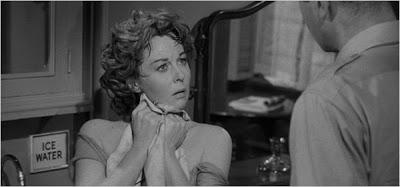Format: Turner Classic Movies on rockin’ flatscreen.

It took Susan Hayward five tries to win an Oscar. Four of those five, including her eventual win, were portrayals of women had fallen in some significant and terrible way. That terrible failing might be alcohol (Smash-Up), booze and a bad marriage (My Foolish Heart), or crime (I Want to Live!). With I’ll Cry Tomorrow, it was a return to alcohol, and many of the same places she went in Smash-Up. It’s also a return to what she did in With a Song in My Heart, in that she’s playing a real person and a real life.
I’ll Cry Tomorrow is the story of Lillian Roth (Hayward), an actress and performer in the early days of the movies. Roth was thrust on stage by her mother (Jo Van Fleet) and forced into a life of performance. It’s never really clear that this was something that Lillian wanted for herself. In fact, when she, out in Hollywood, reconnects with David Tredman (Ray Danton), a childhood friend, she’s absolutely ready to ditch the life completely. David, an entertainment lawyer, gets some solid gigs for Lillian as the two prepare to get married. But David suffered from some mysterious (and never defined) malady, and he dies suddenly while Lillian is on stage.
This is thus the beginning of Lillian’s many, many problems. David’s death leads her to emotional breakdowns, from which she recovers via the bottle and an eventual split from her domineering mother. This leads to a string of disappointing and increasingly dismal relationships. Sailor Wallie (Don Taylor) eventually leaves her since they had only drinking in common and he tired of being Mr. Lillian Roth. The destruction of this relationship leads her to Tony Bardeman (Richard Conte), who promises her that they will both dry out. But he continues to drink and becomes abusive.
Eventually, Lillian escapes and returns to New York and her mother. Because of when this film was produced, we’re going to get an uplift at the end; in this case, that uplift is going to come at the hands of Alcoholics Anonymous and Burt McGuire (Eddie Albert). Recovery is absolutely going to be in the cards here, at least in terms that the film can give us.
It’s Susan Hayward who caused me to watch I’ll Cry Tomorrow and as a fan of Hayward, I can’t say that it was a wasted time watching. But it’s Jo Van Fleet who, more than anyone and anything, is going to stay with me. I’m surprised that wasn’t nominated in a supporting role. Early on, she is brutal and vicious, demanding of her daughter. The pretense is, of course, that she’s doing everything for Lillian, when she’s really doing it for herself. By the end of the film, she is broken, both by her own behavior and that of Lillian and completely pitiable.
But Hayward is the main attraction, and no one dove into these broken roles the way that Susan Hayward did. With a role like this one, where we are going to watch someone go from a position of being wildly popular and successful to literally contemplating suicide in a cheap hotel, a certain amount of buy-in is necessary from our star. Hayward was always game for a role like this one, and here no less than in her other broken and battered roles.
While this is true, there’s also a great deal of unnecessary melodrama with this film. Hayward does what she can, but she’s forced into melodramatic beats. Mid-way through the film, as she tries to dry out on her own, she has a moment of weakness that plays out almost as farce. Toward the end of the film, when she decides to walk into an AA meeting, it takes forever to get her up the stairs and into the door, each step playing out like she’s moments away from public execution.
One aspect of the film I do find interesting is the evident need for Lillian Roth to consistently have a man in her life. The moment one man walks away, she falls for the next one to approach her. In some ways, this is more interesting than her alcoholism—this need for needing someone seems just as destructive and virtually ignored in the film. In fact, this is more or less treated like a symptom of the booze.
I don’t know how much I like this movie. I think it’s interesting, and I’m generally always interested in watching Susan Hayward on the screen, but of her nominated roles, I think this might be the least of them.
Why to watch I’ll Cry Tomorrow: Susan Hayward was a force of nature.
Why not to watch: There are moments of high melodrama that don’t really fit.
